Nutrition knowledge
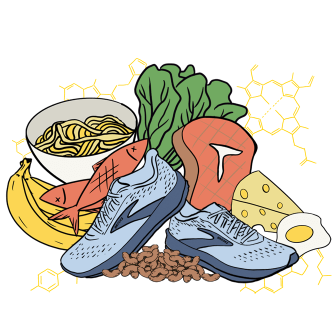
It's no secret that proper nutrition helps fuel your body for a great run. We’ll take a deeper look at why the food we put in our body matters, both for general health and running performance.
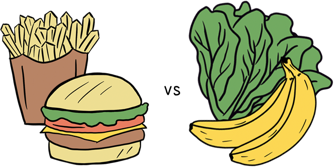
What is good nutrition?
Nutrition is complex because it can mean so many things to different people. Allison Maurer, a registered dietician and assistant athletic director at a high school in Knoxville, Tennessee, explains why it’s hard to give one definition of good nutrition.
“You may have an individual go from eating fast food six times a week down to two, or someone who begins to take hydration more seriously. Both situations could be ‘good nutrition’ for those people, but that definition may not apply to someone else. In general, good nutrition is making positive changes to your fuelling strategy that helps improve performance, prevent injury, and doesn’t leave you feeling like you are restricting or depriving yourself.”
While we all have different bodies and needs, we also know that a healthy diet is a key factor to good health and overall well-being.
For Jamie Mescari Meeks, registered dietician and the nutrition director for the New Orleans Saints NFL team, that means consistently eating a variety of foods from all food groups with an emphasis on fruits, vegetables, lean protein, whole grains, and heart-healthy fats.
These are great baseline choices for everyone, but remember: just because it’s complex, it doesn’t have to be complicated. Nutrition is individual to you, and it’s important to discuss your specific needs with your physician.
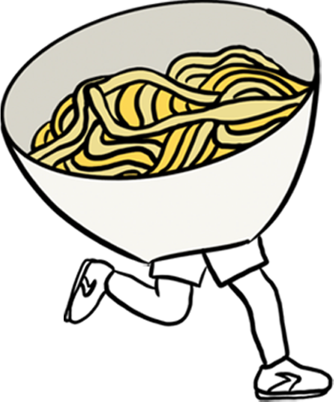
You are what you eat.
Not literally, of course. While we like to have fun with our food here at Brooks (can we interest you in a banana with legs?), what we mean is the food you eat goes hand in hand with your goal-setting and training.
According to Meeks, a well-planned, nutritious diet is important for runners to provide ample energy for their training, recovery, and strength and speed gains. Other benefits include delayed fatigue, reduced soreness and inflammation, minimizing injury risk, and enhanced immunity.
“When runners fuel their bodies before training and races, they are able to optimize their energy and hydration status enabling them to run harder and longer without losing fuel early on in their run or bonking mid-race.
Refueling and hydrating during training runs and races are essential to maintain blood sugar and hydration levels. And recovery nutrition is the most crucial aspect of sports nutrition.
Post-run or post-workout nutrition helps you fully recover and prepare for your next run or race by replacing energy stores, repairing muscle tissue, and replenishing fluid losses.”
What happens to runners when good nutrition turns bad? Maurer cautions that improper fuelling could lead to heightened injury risk in runners and athletes.
“The human body is amazing, and it can endure a lot of stress and trauma. But it has a stopping point. Bad nutrition practices like eating high-fat foods, dehydration, or skipping meals can lead to chronic inflammation, excessive soreness, increased risk of soft tissue injury, higher risk of stress fractures, and other acute and long-term issues.”
Bottom line? Good nutrition helps runners prepare, perform, and recover. Bad nutrition could mean uncomfortable injuries and pressing pause on the sport you love.
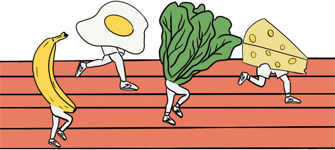
Which foods for what, and when?
Sadly, there is no magical food that will make you run faster or farther. Because — say it with us now — nutrition is different for everyone. But here are the basics of which nutrients are crucial to runners, according to Meeks:
Protein (lean meats, fish, lentils)
- Provides building blocks for the development, growth, and repair of muscle tissues
- Improves muscle recovery and boosts strength Assists in forming hormones, enzymes, and antibodies
- Supports the immune system, bone strength, and formation of hemoglobin (the protein in your red blood cells that carries oxygen to your body's organs and tissues)
Carbohydrates (brown rice, sweet potatoes, whole grain pasta, oats)
- Provides long-lasting and readily available fuel for training and races
- Helps the body use and metabolize protein and fat for many functions such as growth, repair, and energy production
- Delays fatigue, boosts immune function, and speeds recovery
Calcium (yogurt, cheese, chia seeds, leafy greens)
- Main component of bones
- Plays an important role in strengthening and repairing your bones, especially after long or hard runs
- Can decrease the risk of bone injuries like stress fractures
Vitamin D (salmon, egg yolks, vitamin supplements, and a healthy dose of sunshine)
- Assists with calcium absorption
- Essential for bone health, nerve signalling, immune function, blood pressure, and muscle strength
- Vitamin D status may influence regulation of skeletal muscle function, muscle strength, and injury prevention.
Iron (red meat, lentils, beans, fortified cereals, dried fruit, greens)
- Helps oxygen move through the blood to muscles
- Provides energy production
- Strengthens immune function
- Runners can lose iron in many ways including in urine, through the menstrual cycle, and in breakdown of red blood cells via foot strikes when running. Those at higher risk of iron deficiency include women, long distance runners, vegans, vegetarians, and runners with low calorie intake.
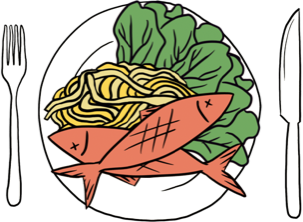
Putting it all together
So how do we apply what you’ve learned about good nutrition to your next endurance run or quick turn around the track?
Maurer breaks it down:
If you are an endurance / distance athlete, the main source of energy used during exercise will be carbohydrates, fat, and a little protein. Once your carbohydrate stores are depleted in your liver and muscles, your body will have to turn to fat and protein for an alternative energy source.
Although this is not ideal, it is oftentimes unavoidable for marathon and ultradistance runners. This makes post-training fuelling of utmost importance, with the focus being on carbs to restore the liver and muscle glycogen stores. But you will also need lean protein and good fats to rebuild what was broken down during your long run.
After a long-distance run, your plate should look like this: half carbs, a quarter lean protein, and a quarter of colours.
On the other hand, sprinters will use almost entirely carbohydrates as an energy source because they are doing such short distance, high-intensity, and high-speed running. Many sprinters do not like to eat much before they compete because they don’t want to feel ‘heavy’ during competitions.
Getting small, high-carb snacks like a Honey Stinger waffle or a half bag of Honey Stinger chews, a granola bar, a serving of pretzels, crackers, or even a sports drink can often be just enough to get a sprinter through a race.
Post-competition for sprinters should be a good balance of protein, carbs, and colours. For that meal, aim for about a third of the plate for each of those items. We know that sprinters will use primarily carbs as a fuel source, but their events may only last between 10 seconds and 3–4 minutes, not the hours that longer distance endurance runners experience.
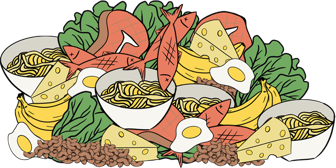
Don’t get overwhelmed.
There is plenty to, ahem, digest, when it comes to nutrition. Remember, this is a science, not an opinion. Both Maurer and Meeks agree that internet ads, social media, and too much googling can get in the way of proper nutrition. If you want to get serious and build a winning sports nutrition plan, seek out a registered dietician who is certified in sports nutrition.
But Meeks reminds us that the elevated athlete route isn’t for everyone.
“You can go down the rabbit hole very quickly if you are looking for the perfect answer, and you’ll never get it. Nobody will ever have the perfect diet, eating schedule, or meal plan. It just doesn’t work in our world where our schedules change multiple times a day.
Just be consistent at the appropriate times: two days before a race, the day before a long training run, and on the days you have a hard workout.
Most of us can think 80/20. If you can properly fuel, hydrate, and take the best care of yourself 80 percent of the time, but the other 20 percent is when you can have some pizza, stay up too late, or enjoy a couple of adult beverages, then so be it.
About the dieticians
Allison Maurer is a veteran sports dietitian with more than 17 years of experience fuelling athletes from high school to collegiate and professional levels. She is the Associate Athletic Director of Student Health and Wellness at Knoxville Catholic High School in Knoxville, Tennessee. In addition, Maurer is the strength coach for football, baseball, and girls basketball, teaches three sports nutrition courses and girls weight training, and conducts team and individual nutrition counselling for student athletes. She is also a consultant and contributor for Honey Stinger.
Jamie Mascari Meeks found her passion for sports nutrition as a freshman at LSU. “Since senior year in high school, I knew I wanted to work with athletes to help them eat right and perform at their highest potential,” she explained. A registered dietitian, Meeks is now the nutrition director for the New Orleans Saints NFL team. She contributes educational articles and provides feedback on products for Honey Stinger as needed.